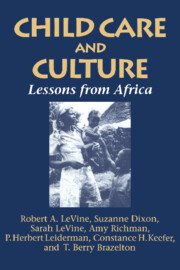Book contents
- Frontmatter
- Contents
- List of tables and figures
- Foreword
- Acknowledgments
- Introduction
- Part I African infancy: Frameworks for understanding
- Part II Parenthood among the Gusii of Kenya
- Part III Infant care and development in a Gusii community
- Part IV Interpretations
- 10 Early child development in an African context: Comparative lessons
- Appendix A Fieldwork procedures: Initial phases and planning
- Appendix B Coding categories for spot observations
- Appendix C Blankhart Nutrition Questionnaire
- Appendix D Temperament Assessment Method
- Appendix E Coding categories for narrative observations
- Appendix F Coding categories for face-to-face interaction
- Appendix G Coding categories for maternal teaching task
- Appendix H Supplementary tables
- Notes
- References
- Index
- Plate section
10 - Early child development in an African context: Comparative lessons
from Part IV - Interpretations
Published online by Cambridge University Press: 11 May 2010
- Frontmatter
- Contents
- List of tables and figures
- Foreword
- Acknowledgments
- Introduction
- Part I African infancy: Frameworks for understanding
- Part II Parenthood among the Gusii of Kenya
- Part III Infant care and development in a Gusii community
- Part IV Interpretations
- 10 Early child development in an African context: Comparative lessons
- Appendix A Fieldwork procedures: Initial phases and planning
- Appendix B Coding categories for spot observations
- Appendix C Blankhart Nutrition Questionnaire
- Appendix D Temperament Assessment Method
- Appendix E Coding categories for narrative observations
- Appendix F Coding categories for face-to-face interaction
- Appendix G Coding categories for maternal teaching task
- Appendix H Supplementary tables
- Notes
- References
- Index
- Plate section
Summary
In this book we have focused on the ordinary devoted mother of Kisii District, Kenya, and her provision of a facilitating environment for the maturational processes of her infants during the years 1974–1976. Using these terms coined by the British pediatrician-psychoanalyst D. W. Winnicott implies a general similarity between Gusii mothers and the English mothers Winnicott observed: Both are committed to help their infants grow and thrive. It does not mean, however, that the care they provide is the same. On the contrary, the evidence presented in the foregoing chapters indicates that Gusii mothers' understanding of what is best for their babies, the goals of care to which they are devoted, the specific processes they seek to facilitate, their methods of facilitation, and the kind of caregiving environment in which the methods are embedded, differ from those of London or the suburban United States. In this chapter we analyze these similarities and differences comparatively as cultural models with developmental consequences, taking first the perspective of the parent and then that of the developing child. Moving beyond the cultural relativity of these divergent models, we assess the costs and benefits of their associated practices during infancy and in subsequent development. Finally, we explore the implications of this analysis for theories of child development and the acquisition of culture.
INFANT CARE AMONG THE GUSII AND THE AMERICAN WHITE MIDDLE CLASS
In comparing these two populations, we cross the major socioeconomic and demographic divisions between a rural African people and the affluent, urbanized people of a Western industrial country.
- Type
- Chapter
- Information
- Child Care and CultureLessons from Africa, pp. 247 - 274Publisher: Cambridge University PressPrint publication year: 1994

